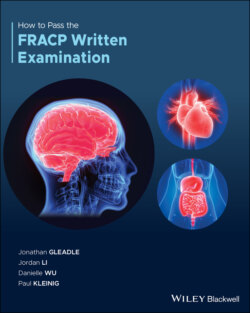Читать книгу How to Pass the FRACP Written Examination - Jonathan Gleadle - Страница 24
QUESTIONS (35–5–36) REFER TO THE FOLLOWING INFORMATION
ОглавлениеMatch the clinical presentation with the appropriate endocrine investigations.
1 24‐hour urinary catecholamines and metanephrines.
2 24‐hour urinary cortisol.
3 Blood renin/aldosterone ratio.
4 Plasma vasopressin level.
5 Saline infusion test.
6 Thyroid function test.
7 Urinary sodium and osmolality.
8 Water deprivation test.
1 35. A 76‐year‐old woman presents with confusion. Her family reports her being constipated and gaining 5 kg weight in recent months. On examination, she is alert but disoriented in time and place. Her HR is 52 bpm and BP is 158/95 mmHg. There is non‐pitting oedema in the bilateral low limbs. The CXR reveals cardiomegaly and bilateral small pleural effusions. Apart from mild hyponatraemia (serum sodium level 133 mmol/L), other biochemistry results are unremarkable. What is the next most appropriate investigation?
2 36. A 68‐year‐old woman presents after a two‐day history of vomiting. She is found to have hypernatraemia but her elevated serum sodium concentration did not improve despite adequate fluid replacement. She has history of bipolar disorder and has been taking lithium for the past 8 years. What is the appropriate investigation after stabilizing this patient clinically?
